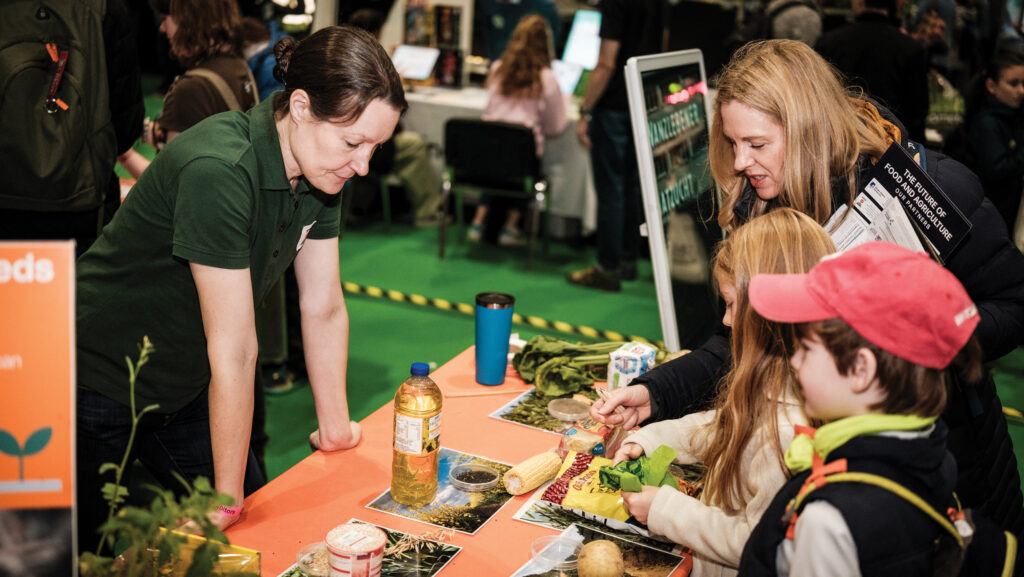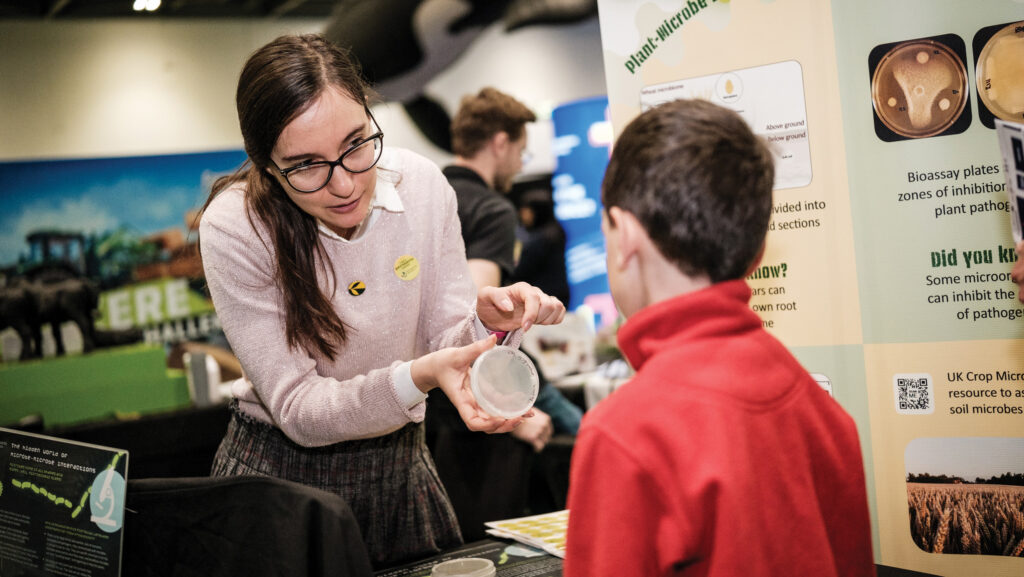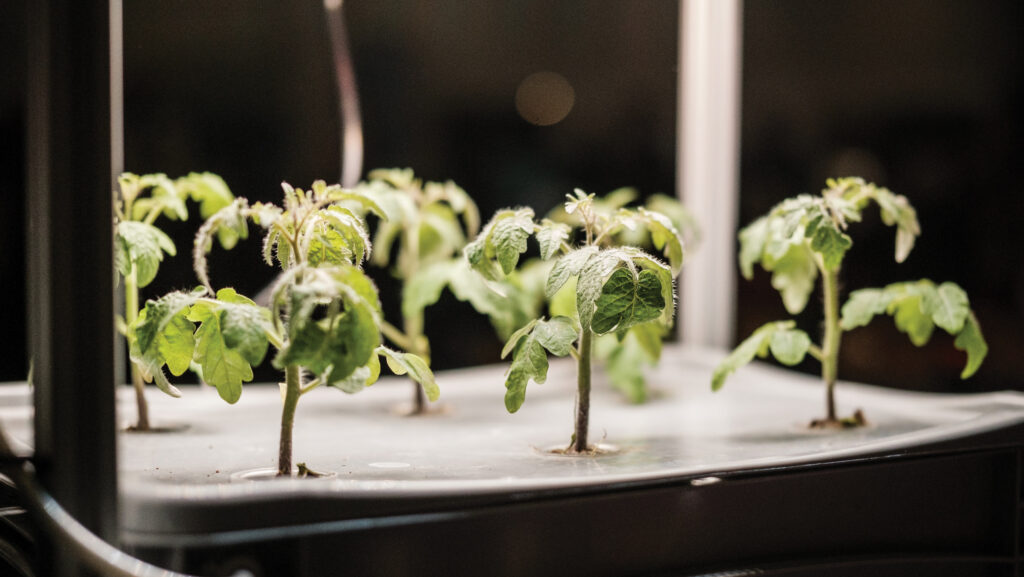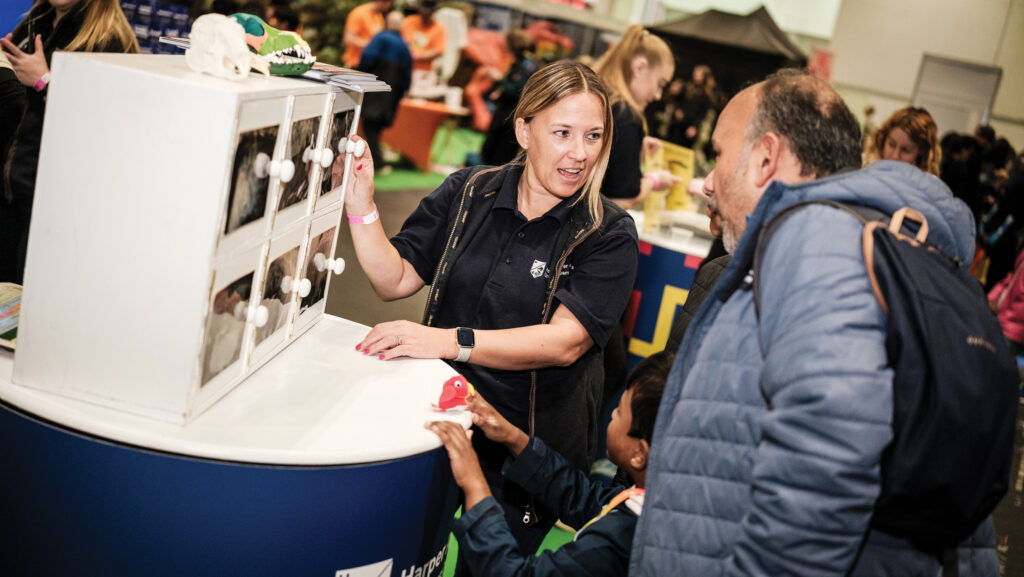FW and agri-food sector set to inspire young minds
 Inquisitive minds learn where our food comes from © MAG/Colin Miller
Inquisitive minds learn where our food comes from © MAG/Colin Miller Slugs, bugs and mutant yeast are all on the menu at this year’s New Scientist Live (18-20 October), where thousands of members of the public are expected over the three-day event.
As part of this annual festival of science and technology, Farmers Weekly and partners will be bringing our industry to life through interactive exhibits that give visitors a taste of the wide range of opportunities across the food supply chain, from farm to fork.
What is New Scientist Live?

The world’s biggest festival of ideas and discoveries runs from 18-20 October at ExCeL, London.
New Scientist Live attracts thousands of people every year including career-minded science, technology, engineering and maths (Stem) students.
Over the three days, visitors can get hands-on with a multitude of exhibits across the show floor and be inspired by thought-provoking talks.
For further information, see live.newscientist.com.
Educational activities
On the Future of Food & Agriculture exhibit, people will be able to explore all things agriculture, from beneficial insects and slimy crop pests to the microscopic fungus used in viticulture and the intricacies of veterinary practices, getting hands-on with some fun, educational activities.
Garford will be bringing along some big weeding kit to climb aboard, and there’s the opportunity to take the wheel in one of several simulators on the Weetabix stand, which will also feature a miniature radio-controlled combine harvester obstacle/racecourse.
The show welcomes people of all ages over the weekend, then Schools Day on Monday 20 October gives thousands of children exclusive access to the exhibition floor.
For these Stem (science, technology, engineering and maths) students, the Future of Food & Agriculture exhibit is a chance to see first-hand the bright future the industry can offer them.
KWS researcher Nicholas Bird says: “New Scientist Live enables greater understanding of the complexities involved in farming, but also inspires the next generation of scientists to join the effort to feed the world.”
That effort is only going to become more challenging and require more people as the global population grows.
The part that farming can play in mitigating the risks of climate change and helping to lower carbon emissions are key driving forces behind the need for fresh talent both behind the farm gate and well beyond it.

Visitors will discover the science behind farming through hands-on activities © MAG/Colin Miller
Sustainable food systems
With the tagline “feeding the world sustainably” the Farmers Weekly exhibit aims to inspire the next generation to get on board.
Showgoers will be able to see how farmers are sustainably growing high-quality produce while also looking after the environment.
Linking Environment and Farming (Leaf) will be looking to sign up 15- to 18-year-olds with a passion for tackling global challenges to its “Sustainable You(th) Challenge: Growing a Better Future” initiative.
Scientists from Rothamsted Research and the John Innes Centre will be showcasing their behind-the-scenes work supporting science-led agriculture.
The John Innes Centre will be using microscopes to unlock the hidden world of wheat leaves.
Head of communications and engagement, Dr Felicity Perry, says people will be able to learn about stomata and how some plant diseases exploit it as a gateway to infect a plant.

© MAG/Colin Miller
Talent for innovation
To attract new talent into the food and farming sector, proving that farming is anything but slow-moving and low-tech is vital.
Arla will be showcasing what a career in modern dairying is really like, dispelling some common misconceptions among the public.
“We’ll also have some tasty and nutritious products for everyone to try,” adds Arla’s UK agricultural director, Paul Dover.
Helen Brookes, engagement director at the UK Agri-Tech Centre, believes it’s all about making technological advancements a reality for young people today.
“The way we can enhance resilience against slugs is an example of the great work that can be accomplished by collaborating scientific minds.”
Disciplines such as robotics, data science, AI, and bioengineering are all core to the agri-food industry, and careers in these areas need diverse talent, drawn from right across the UK, says Prof Ken Sloan, vice-chancellor of Harper Adams University.
“Feeding a growing population well and sustainably is they key challenge which faces our planet – and this vital field is a hotbed for innovation.”

© MAG/Colin Miller
Dynamic data
A more resilient, environmentally conscious, and data-driven supply chain is key to the longevity of the agri-food industry, says Weetabix’s Dr Peter Chandley:
“This is an exciting, dynamic and high-tech sector, and we need new scientists and engineers to help solve environmental challenges and secure our future.”
As Map of Ag’s sustainability consultant Ben Hunt puts it: “We want to inspire the next generation to see agriculture not just as farming, but as a future powered by Stem innovation.”
Also on show
- On the Linking Environment and Farming (Leaf) stand, visitors can explore the vital role of soil, and understand more about Leaf Marque accredited produce, matching items
to their countries of origin on a map. - Reaseheath College’s tractor simulator will let showgoers try their hand at real farming tasks in a safe, fun environment and see if they’ve got what it takes to handle life on the farm, while the mini vertical farm shows how crops can grow sustainably without soil, using recycled water and nutrients.
- Arla invites showgoers to discover where their milk really comes from. They can meet farmers and explore fun, hands-on activities that show how our industry uses science, technology and innovation to fill fridges around the UK.
- KWS will be highlighting the journey from seed to product, encompassing multiple areas of the food chain in the process. The variety quiz asks people to match major food crops to their seeds, and to the everyday products found in local shops.
- Garford will be demonstrating precision kit in the form of its Robocrop Guided 3 Row InRow Weeder, showing visitors how it reduces the use of chemicals by targeting the weeds more precisely.
- Will spray drones change the way we farm? That’s the question Harper Adams will be asking. Visitors can discover how spray drones enable targeted spraying, reducing chemical usage and minimising environmental impact. Plus budding veterinarians can take on the cattle rectal stimulator challenge
- Plumpton College will be explaining how by harnessing the power of mutant yeast, we’re not just solving today’s challenges – we can unlock the secrets of flavour, ensuring the future of winemaking is both resilient and extraordinary. “Through science, we unravel why wine tastes the way it does and shape the tastes of tomorrow, says Plumpton’s Sam Linter, director of wine.
- Lantra will be demonstrating technology used in agriculture and livestock production – technology that has close links to human health disease recognition and prevention.
Find more career information
From getting your first job in agriculture to maintaining your work skills and developing your career, find advice and insights at fwi.co.uk/careers
Partners
Harper Adams University is our lead education partner

